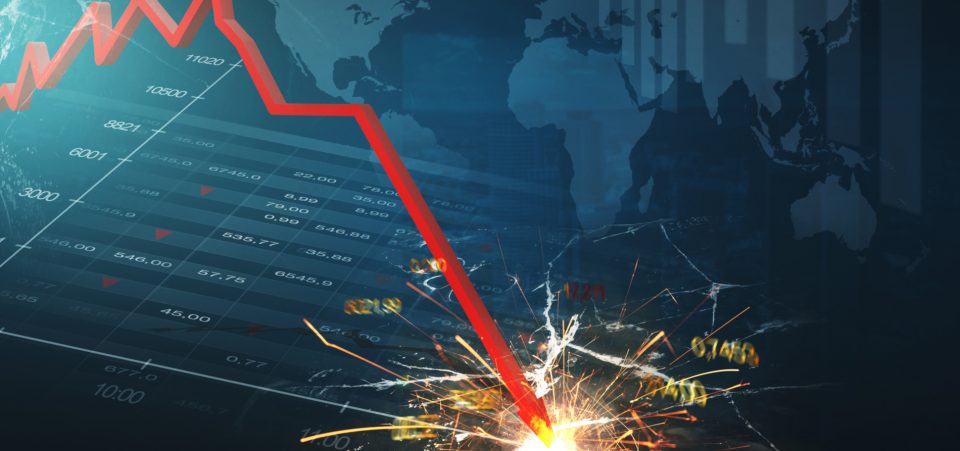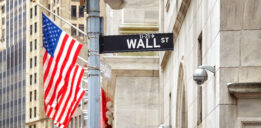Irrational Exuberance Is Back and Ready to Trigger a Stock Market Crash
At first glance, the stock rally on Wall Street makes the Running of the Bulls in Pamplona look like it’s high on grass. Yet, a better metaphor might be that of hippos dancing on thin ice or investors gearing up for an imminent stock market crash.
Stocks make up some 50% of all pension fund portfolios in the United States. Retirement money managers, such as those managing firefighters, teachers, and other government workers, have put almost 60% of their savings in equities as of June 30, 2018. (Source: “Pension Funds Are Boosting Bull Market Bets as Stocks Climb Higher,” The Wall Street Journal, August 7, 2018.)
It’s no wonder then that the Dow Jones has achieved a new record high, just shy of 27,000 points.
Still, it is a wonder if those same pension funds have been dipping their toes into weed companies.
And, while in an entirely separate arena, one must wonder if someone in the Donald Trump administration has smoked one too many joints, thinking that sanctioning China over its defense procurement decisions is any of its business.
What Could Go Wrong?
As it happens, the stampeding marijuana stocks and the defense stocks are correlated.
The first have taken the “irrational exuberance” mantle from the tech stocks. The latter represents the flipside: the safety net that stands between total economic collapse and a stock market crash.
You’d have to be on crack not to see where the marijuana stocks are going—or, rather, the misplaced enthusiasm that’s driving their value.
Where have we seen this all before? Why, it was during the late 1990s with the tech bubble. It burst in a stock market crash, which ended up wiping out some of the most iconic brands of the dotcom era. Everyone remembers Pets.com…
The marijuana stock bubble may just be worse.
Submitted for your approval is the stock of one Tilray Inc (NASDAQ:TLRY).
Tilray stock, as the chart shows, serves as a perfect example of the resurgent irrational exuberance.

Chart courtesy of StockCharts.com
It’s a company that produces revenues of $28.0 million in annual revenue. That’s a respectable amount for a busy Starbucks café.
Nevertheless, just a few months after listing on Wall Street at $17.00 a share in July 2018, Tilray stock has gained some 2,000%.
It reached $300.00 a share on September 19, 2018, boasting a market cap of some $36.0 billion. That’s more than Twitter Inc (NASDAQ:TWTR) with its 340-million-plus daily users.
Even after some investors started to recover from their hangovers and cooler heads prevailed, bringing the marijuana company down from its high to $116.00 a share, the market cap was still about $10.5 billion.
Enter Tesla: Could It Set a Stock Market Crash in Motion?
It seems fitting that Elon Musk, CEO of Tesla Inc (NASDAQ:TSLA), spoke to Joe Rogan in a podcast while smoking marijuana. Indeed, Tesla stock could well produce the spark that triggers the next major stock market crash.
This time it’s serious. Even legal marijuana won’t keep Tesla investors from having to confront the facts many critics have pointed out about the electric car company, ever since it went public on June 29, 2010.
Tesla may survive in the long term. But it may look and act like a completely different company.
Even more than in the case of Steve Jobs and Apple Inc. (NASDAQ:AAPL), Elon Musk fully represents the company he has led, almost since it was conceived.
Thus, news that Musk could lose his seat at the helm will hit Tesla investors, customers, and fans hard.
It’s All in the Timing or the Context
Given the context in which the news has broken—a budding trade war with China in the midst of stocks making record highs with earnings fueled by tax cuts (an effect not unlike athletes setting records under the influence of steroids)—Tesla could induce a much-needed moment of reflection.
On September 27, the U.S. Securities and Exchange Commission (SEC) announced that it was suing Elon Musk, accusing him of fraud and of misleading investors. The smoking gun happens to be a tweet.
Am considering taking Tesla private at $420. Funding secured.
— Elon Musk (@elonmusk) August 7, 2018
On August 7, Musk tweeted that he intended to turn Tesla into a private company, delisting it from the Nasdaq.
Musk’s legally compromising position arises from the fact that, the SEC alleges, he failed to inform relevant authorities of his delisting intentions as well as the price at which he intended to close off the listing (which we know to be $420.00/share).
At the time of writing, Tesla stock has dropped by over 12%.
Yet, the delisting debacle represents only a fraction of Tesla’s problems.
In August, the SEC started to probe Tesla and Musk over the almost chronic delays related to the production, and delivery, of the company’s “Model 3” as well as overly optimistic sales projections. (Source: “SEC also investigating Tesla over Model 3 production claims,” MarketWatch, August 16, 2018.)
Musk now risks at the very least a heavy fine. More significantly, Tesla will have to compensate investors for all of the gains that the company secured because of the “delisting” tweet.
The SEC is implying that Tesla’s stock rose because of false statements.
The SEC may also demand that Musk—who just recently pulled out of a no-guilt settlement deal with the SEC—be fired from his post as Tesla CEO and barred from running a public company in the U.S. for having violated the governance rules for publicly traded companies.
Musk Symbolizes Innovation & Silicon Valley Entrepreneurship
For Americans and foreigners alike—and youth, in particular—Musk represents the best face of innovation and social responsibility. Arguably, he enjoys a more cult-like following than Steve Jobs.
His departure could set off an avalanche of many Silicon Valley or FANG stocks—Facebook, Inc. (NASDAQ:FB), Amazon.com, Inc. (NASDAQ:AMZN), Netflix, Inc. (NASDAQ:NFLX), and Alphabet Inc (NASDAQ:GOOG), aka Google—on Wall Street.
Certainly, the SEC investigation has shed light on what may be a rather curious corporate environment at Tesla. Several top-level managers at the company have abandoned Tesla, which has been playing ever more the role of a sinking ship.
There’s a Way to Hang on to Wall Street & Survive the Imminent Stock Market Crash
Trump’s protectionism, along with the U.S. government’s penchant to impose sanctions on those who resist its influence, will accelerate the emergence of new trade blocs and new economic-political alliances.
China is advancing the development of a new Silk Route. It will move resources and goods swiftly from the Far East of Asia to the Far West of Europe via railway.
In turn, tensions with Russia will exacerbate—apart from and beyond what issues such as Syria and Ukraine have already done.
This will ensure one shining beam of light amid the fog: the defense sector will continue to benefit from heavy military funding. Companies like Lockheed Martin Corporation (NYSE:LMT), Northrop Grumman Corporation (NYSE:NOC), General Dynamics (NYSE:GD), or Raytheon Co. (NYSE:RTN) should continue to produce wealth—or at least preserve it.
War in Syria Will Keep Defense-Sector Companies Busy
Moreover, the rising tensions over Syria and Russia—the Israelis recently attacked northern Syria, triggering the crash of a Russian military transport plane with 20 on board—will continue to keep defense stocks relevant.
President Trump has indicated that the United States will not be leaving Syria any time soon, claiming the need to finish the “job” against ISIS.
The Russians and Syrians are trying to restore the authority of President Bashar al-Assad throughout Syrian territory and begin an intense civic and infrastructure reconstruction process.
The two ambitions—the United States’ continued presence in the Middle East and the need to rebuild—will force Russia to remain in the region, maintaining a hostile stance. You can learn more about the situation in my interview with RT.
Meanwhile, the U.S. is quietly pursuing a regime change in Iran amid a wider context of war and tensions in the Arabian Peninsula (Yemen, Qatar-Saudi Arabia).
In short, the arms race will continue. And if the Middle East weren’t sufficient, President Trump is enthusiastically considering building a major and permanent U.S. base in Poland (aka “Fort Trump”), further antagonizing Russia.
By throwing money into defense spending, Trump tries to provide a series of stimuli for the country’s economic growth.
In other words, by making the big companies of the military-industrial complex work (a definition that was first used by President Dwight Eisenhower in his 1961 farewell address), the White House hopes to create jobs and boost the economy.






